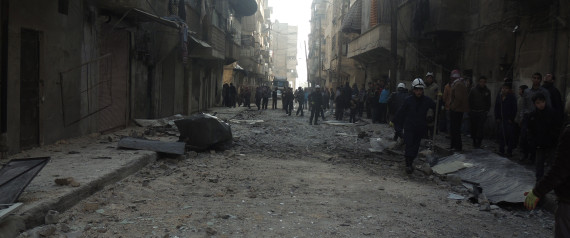Hell On Earth
It's a free-for-all in Syria. The never-organized, intransigent-to-cooperation rebel forces are battling on two fronts. They have their conflict with the regime of Baathist Alawite Bashar al-Assad, and they rage against the successful incursion of al-Qaeda-led forces usurping for themselves the advantage in a breakdown of Syrian social order and geography. The regime is delighted with the very real presence of Islamists in Syria, as opposed to the phantom presence Mr. al-Assad had originally asserted.
Syrian civilians and emergency personnel stand on a damaged street
after government forces allegedly shelled the northern Syrian city of
Aleppo on January 6, 2014. (MOHAMMED WESAM/AFP/Getty Images)
| AFP via Getty Images
Low-level, episodic incidents of violence between the rebel groups opposed to President Assad from the initiation of the civil war and the Islamic intruders have now given way to sustained violence between the al-Qaeda-linked factions across parts of northern Syria, and the opposition forces. Four provinces are now the venue where moderate and ultraconservative Islamist brigades are aligning themselves against the Islamic State of Iraq and the Levant.
Not that the Syrian rebel groups have decided to unify in their opposition to either the regime or the Islamic State of Iraq and the Levant, but a spontaneous, and somewhat shared burst of violence within communities where tensions were already on the boil. But that isn't happening everywhere; in some areas there is cooperation between rebel factions and the Islamic State of Iraq and the Levant in their war with government forces.
Yet the backlash against the presence of the Islamic State of Iraq and the Levant, on the back burner for some time, has finally moved to a forward position; the foreigners who shoved their way into rebel areas, crushing some armed opposition groups and co-opting the positions of others to overtake their turf has come to a full rolling boil. There are ample dead representing both sides.
And the rebel forces' determination to continue their conflict with the regime has been effectively sidelined by this new conflict that has come to the fore. That the factions are violently opposing one another is seen by the regime as an advantage to them on a number of fronts; the most obvious being that their attention has been turned elsewhere. But the most advantageous is how the situation is seen by the international community before the 'peace conference' for Syria takes place imminently.
As far as Western authorities are concerned, the prominence within Syria of the Nusra Front and the Islamic State of Iraq and the Levant is a fearful concern, representing the major if not sole reason that support for the rebels has died back in recent months. As though the consequences of the bloody conflict are not dire enough; the entrance of the Islamists has eclipsed the brutality of the regime by beheadings of captured government fighters, kidnapping of anti-Assad activists, journalists and civilians expressing criticism of the Islamists.
The Islamic Front representing an umbrella group of ultraconservative Islamic fighters had issued a statement wherein they stated they ordered the Islamic State of Iraq and the Levant to hand over the killers of a popular doctor, Hussein Suleiman, from the northern province of Aleppo. The killers meant to be placed on trial. With no response from the extremist Islamists, clashes were incurred and fighting spread to the north-eastern province of Idlib and the central province of Hama.
The Islamic State of Iraq and the Levant, defending their 'territory' have used car bombs usually reserved for the attack of government forces, against the rebels in Manbij, Aleppo province where some of the heaviest fighting is taking place. The rebels and the al-Qaeda groups have nothing whatever in common as far as their tactics, techniques and priorities are concerned, though in theory they are both battling the Syrian regime.
To the West, the once-unlikely apprehension of Bashar al-Assad as a butcher who must answer for is actions at the International Criminal Court has been dimmed in the new realities of the impossibility of the potential of al-Qaeda-linked groups declaring a state of their own in part of Syria. Suddenly, the alternative is the continued acceptance and perhaps even support of Bashar al-Assad as president of what is left of Syria.
The battles that have ensued on three fronts, have given the advantage to the regime, which can count on the usefulness of its own extremist Islamist Shia militia Hezbollah, to more than match the savagery and determination of the Sunni Islamist al-Qaeda affiliates. This scenario is surely a fairly accurate description of Hell on Earth, another irony presenting itself in the ancient geography where the Garden of Eden was apocryphally said to have existed.
Labels: Al-Qaeda, Conflict, Islamism, Revolution, Syria

<< Home